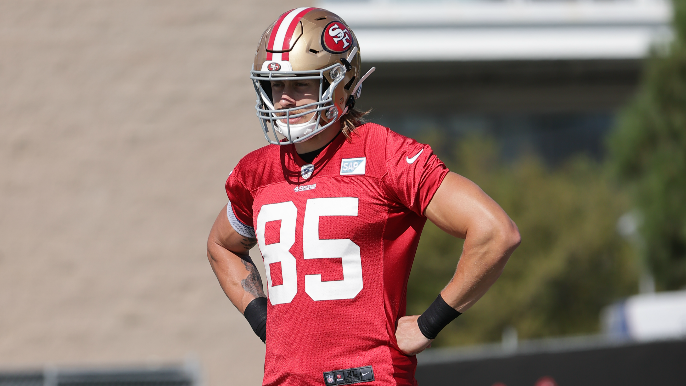Photo credit: 49ers
For a brief while, John Lynch can exhale. Having replaced Emmanuel Sanders with Brandon Aiyuk, DeForest Buckner with Javon Kinlaw, Joe Staley with Trent Williams and finally, extending George Kittle through 2025 on a $75 million deal, Lynch has handled the most pressing issues that faced the 49ers this offseason.
But less than a week ago, progress on the Kittle deal was deemed “minimal,” according to NFL Network’s Mike Silver, following a conversation with Kittle’s agent Jack Bechta. An inchworm emoji from Bechta summed up the state of affairs.
More concerning than the pace of talks was what Silver deemed a “philosophical divide” on both sides.
“At the heart of this is sort of a philosophical divide between the 49ers who say listen, ‘We want to pay you more than any tight end ever, because you’re the greatest tight end,’ and Kittle’s camp which is saying, ‘don’t view me as a tight end. I was just voted the seventh best player in football at any position,’” Silver said.
So how did the 49ers and Bechta go from a philosophical divide to hammering out a five-year deal which makes Kittle the NFL’s top-paid tight end?
According to Lynch, it was due to a handful of factors, and an approach, from Kittle’s camp, to work with the 49ers.
First, the 49ers and Kittle were motivated to get a deal done before the true start of training camp, when 11-on-11 practices began (Saturday) and pads come on (Monday).
“In the last couple of weeks, we felt like we were drawing nearer,” Lynch said. “Jack [Bechta] did a great job of fighting for his client, and I think he knew he had had some time. In terms of deadlines, there really wasn’t one on this because George was under contract for this year, but I think everybody felt maybe not a need, but a want to get this done before we stepped down there with helmets, 11-on-11 and all that and so I felt confident that that we were making progress throughout. Really felt like in the last two weeks really that any day could have been the day. And we had movement on the day it eventually got agreed to.”
Kittle said that he felt a desire to get a deal done to ensure he had financial security before pads came on so that he didn’t have to play while worried about getting injured.
Perhaps the most significant factor was not a concession by either side, but the fact that the NFL and NFL Players Association came to an agreement on a $175 million cap floor for 2021 on July 24. That would be a roughly $23 million drop from this year and in effect, a $33 million drop from the expected $10-ish million per year the league typically has the cap rise by, but it gave teams a reference for the worst case scenario.
“That was another element of challenge throughout this thing,” Lynch said. “In the midst of a pandemic, really not knowing without an agreement between the, the owners and the PA exactly where the cap numbers were going to fall. We still don’t know that but we got a better idea and that helped us craft this deal, frankly.”
Knowing that the cap could not drop any further, the 49ers had a framework with which they could operate. The consideration of lost revenue was still there, but the fear of losing something in the $40-plus million range next year was gone.
Lynch made a point to credit Kittle and Bechta for working with the 49ers with the knowledge that the losses in 2021 are still expected to be substantial. He also said it wasn’t a backloaded deal, which implies that Kittle may not make much over the next two seasons, but from 2022-2024, he’ll receive the bulk of his money.
“Jack [Bechta] was great working with us to the point where it’s certainly not a backloaded contract, but there’s some creative things that that were done within the contract to make it such that it behooves everybody,” Lynch said.
One of the issues they worked through was that Kittle wanted to and deserved to shatter the long-stagnant tight end market which had topped out around Jimmy Graham’s $10 million per year. Lynch recalled going through something similar as a player, when the safety market was weak, and he said he had a duty to fellow safeties to work out an elite deal. He briefly became the top-paid safety in the NFL in 2000, he said, before Brian Dawkins eclipsed him within 24 hours, signing a six-year, $24 million deal with a reported $5.6 million guaranteed.
Kittle acknowledged on Saturday that getting a deal to shift the standard for tight ends was a priority.
“I think overall, tight ends are occasionally forgot about or not advertised enough,” Kittle said. “And I think the fact that guys are exploding through the ceiling that was set with me, Travis Kelce got a fantastic new deal, Ertz is about to get one. Guys that are just blowing through that, it’s just it’s fun to see and I think tight ends will just continue to prove that we’re worth a lot to the team and I’m just thankful that the Niners organization believed in me and gave me that opportunity.”
The conclusion of that business leaves Kittle with a reported $30 million guaranteed ($40 million for injury) and the 49ers with their best player for the next half decade.
“This was a win for us but I think also a win for the other side and I believe that’s how everybody feels on this deal,” Lynch said.




